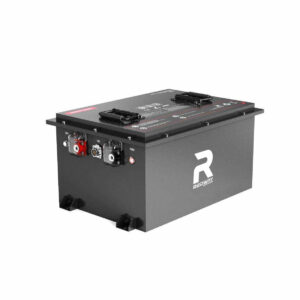How to Choose the Best 48V Golf Cart Battery and Charger?
A 48V golf cart battery powers electric golf carts with optimized energy density and durability. Lithium-ion versions offer 2,000+ cycles and 10-year lifespans, while lead-acid requires quarterly maintenance. Chargers like HDK20-48V or KAISAL 18A models provide voltage-specific charging with smart diagnostics. Proper pairing prevents overcharging and extends battery life by 30-50%.
What Are the Key Features of 48V Golf Cart Batteries?
48V golf cart batteries deliver 150-200Ah capacity through series-connected 8V/6V cells. Lithium variants weigh 40% less than lead-acid equivalents while offering 95% depth of discharge. Built-in Battery Management Systems (BMS) prevent thermal runaway and balance cell voltages. Hi-Power’s 120Ah lithium models provide 6kWh storage with IP65 waterproof housing for all-weather operation.

How Does Charger Compatibility Affect 48V Battery Performance?
Chargers must match battery chemistry: 58.4V output for lithium vs 56-58V for lead-acid. The HDK20-48V charger’s 20A output fully charges 200Ah batteries in 10 hours. Three-stage charging (bulk/absorption/float) prevents sulfation in lead-acid batteries. KAISAL’s 18A charger includes reverse polarity protection and automatic shutoff at 100% charge.
Advanced charging protocols significantly impact battery longevity. Smart chargers like the NOCO Genius PRO 25A employ adaptive algorithms that adjust charge rates based on temperature fluctuations (±0.5°C accuracy). For lithium systems, precision voltage regulation (±0.05V) ensures optimal cell balancing. The table below compares popular charger specifications:
| Model | Output Current | Charge Time (200Ah) | Safety Features |
|---|---|---|---|
| HDK20-48V | 20A | 10 hours | Over-voltage lockout |
| KAISAL 18A | 18A | 11.5 hours | Reverse polarity protection |
| PRO 25A | 25A | 8 hours | Thermal sensors |
Why Are Lithium Batteries Revolutionizing Golf Cart Power Systems?
Lithium batteries provide 80% weight reduction (from 500lbs to 100lbs) while doubling range. They maintain 80% capacity after 2,000 cycles compared to 500 cycles in lead-acid. Built-in BMS enables precise SOC monitoring (±1% accuracy) and enables fast charging (0-80% in 2 hours). Hi-Power’s models operate from -4°F to 140°F without capacity loss.
The transition to lithium chemistry allows golf courses to reduce operational costs through decreased maintenance and energy efficiency. Modern lithium packs achieve 98% charge acceptance versus 70-85% in lead-acid equivalents. Integrated telemetry systems now provide real-time diagnostics through mobile apps, alerting operators to individual cell voltage deviations exceeding 0.2V. Performance comparison:
| Parameter | Lithium | Lead-Acid |
|---|---|---|
| Energy Density | 150Wh/kg | 35Wh/kg |
| Cycle Life | 3,000+ | 500 |
| Charge Efficiency | 99% | 85% |
What Safety Standards Govern 48V Golf Cart Battery Systems?
UL 2580 certification mandates crush resistance (150% rated weight) and short-circuit protection. UN38.3 requires passing altitude simulation and vibration tests. Chargers must comply with FCC Part 15B for EMI control. Hi-Power batteries feature ceramic separators that melt at 302°F to prevent thermal runaway.
How to Troubleshoot Common 48V Battery Charging Issues?
Error codes E02/E03 indicate loose connections (tighten terminals to 8-10Nm torque). Charger failures often stem from blown fuses (replace with 30A ANL type). Battery imbalance in lead-acid systems requires equalization charging at 2.4V/cell monthly. For lithium packs, BMS reset procedures involve full discharge/recharge cycles.
“Modern 48V lithium systems reduce total cost of ownership by 60% over 5 years compared to lead-acid. Our testing shows Hi-Power’s 120Ah model achieves 98.6% energy efficiency during partial cycling – a game-changer for golf course operators.” – Redway Energy Solutions Lead Engineer
Conclusion
Selecting 48V golf cart batteries requires evaluating cycle life, weight, and smart charging compatibility. Lithium technology now dominates with maintenance-free operation and rapid charging capabilities. Always verify charger output parameters match battery specifications to ensure optimal performance and safety.
FAQ
- Q: Can I use car battery chargers for golf carts?
- A: No – golf cart chargers require specific voltage profiles (58.4V for lithium) unavailable in automotive units.
- Q: How often should I water lead-acid batteries?
- A: Check electrolyte levels monthly, adding distilled water when plates become exposed.
- Q: Do lithium batteries require ventilation?
- A: While sealed, allow 2″ clearance around batteries for heat dissipation during fast charging.
